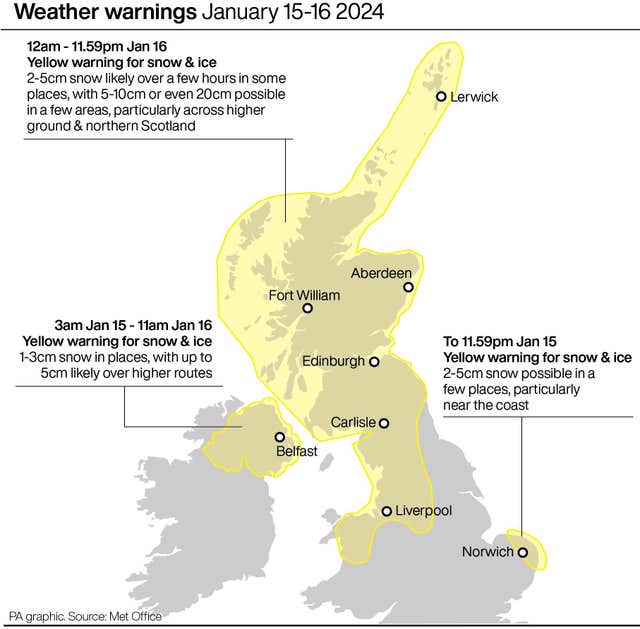Arctic air plunging much of country into another cold day
A ‘band of snow’ forecast across Scotland, Northern Ireland and parts of northern England and Wales on Tuesday.

Much of Britain is facing another day of cold temperatures and travel disruption after overnight lows dropped below freezing for the bulk of the country.
Some parts of northern England, including Merseyside, woke to snow on Tuesday morning, with outbreaks of sleet and snow forecast to become more persistent during the day.
A yellow warning is in place for snow and ice across Scotland, much of northern England and parts of north Wales until midnight on Tuesday, as well as for Northern Ireland until 11am.
The warnings continue across large swathes of the northern half of the country until Thursday.
Northern and eastern parts of Scotland saw the “bulk of the snow” on Monday, with 15cm on the ground at Aberdeen Airport by the evening.
A “cold plunge of Arctic air” has moved south across the whole country over the past few days, making it 5C to 6C lower than usual for this time of year, the Met Office said.
Met Office forecaster Craig Snell said Tuesday could see a “persistent band of snow” over three to six hours across Scotland, Northern Ireland and parts of northern England and Wales.
He said: “In the early hours of the morning we’re looking at temperatures getting down to -12C in a few spots, Tuesday night possibly down to -15C.
“So certainly a very cold spell into Wednesday.”

It comes as the Government confirmed thousands of households in England and Wales are eligible for cold weather payments.
They are made to vulnerable people, including pensioners, to help them pay for heating when the temperature dips below freezing.
It goes to those living in an area where the average temperature is recorded as, or forecast to be, 0C or below over seven consecutive days.
Payments will be made to homes across Cumbria, Oxfordshire, Yorkshire, Northumberland, Norfolk, Staffordshire and Powys in Wales.
The UK Health Security Agency has issued a Cold-Health Alert, which warns of possible impacts for the health and social care sector.
National Highways has put in place a severe weather alert for snow affecting the North West on Tuesday, with road users advised to plan ahead and some rural communities warned they could be temporarily cut off.

Amy Fellows, national network manager at National Highways, said: “Freezing conditions bring so many hazards such as snow and ice, so take every possible step to understand your journey in advance and allow lots of extra time when travelling to prepare for the unexpected.”
Stein Connelly, head of transport resilience at Transport Scotland, said the cold snap had caused difficult driving conditions with further “severe impacts” anticipated on Tuesday.
National Rail has warned the wintry weather could affect train journeys all week with ScotRail saying services on the Highland Mainline route on Tuesday would be delayed by around 30 minutes.
Around 200 schools across Aberdeenshire, Moray and Shetland were closed due to snow on Monday.
Met Office chief meteorologist Andy Page said: “There will be widespread frost this week and we could see some fairly deep laying snow in parts of northern UK and strong winds could result in drifting or blizzard conditions at times.
“The snow and ice will be disruptive and could potentially impact travel plans, make driving dangerous and pavements slippery.”
Forecasters say there is the potential for “some snow” in southern England mid-week as a low-pressure system moves across northern France.
Met Office deputy chief meteorologist Nick Silkstone said: “The track of this system still has some small but all-important uncertainties tied to its northern extent, and it has the potential to bring some snow to southern England.
“However, our preferred solution suggests minimal snowfall (a couple of cm at most) across parts of the extreme south of England in association with this system, but we are keeping an eye on how things develop and will update the forecast as needed.”




